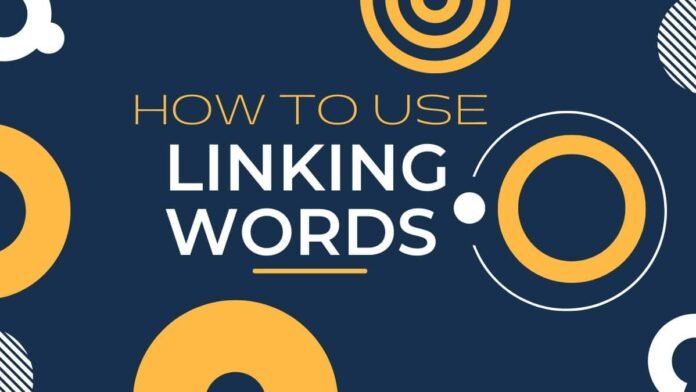When it comes to writing or speaking, linking words are important to ensure your ideas flow together nicely. Think of them like little guideposts that help your reader or listener follow along with your thoughts. They aid in understanding how different parts relate to each other. Linking words can help you show connections between ideas, like adding something to your words, contrasting it with something else, or explaining why something happened. They’re beneficial for making sure your communication is clear.
TABLE OF CONTENT
- Addition
- Contrast/Concession
- Purpose
- Similarity
- Cause/Reason
- Effect/Result
- Giving Examples
- List ideas in order of time
- Summarizing/Concluding
- Download Linking Words PDF
Addition Linking Words
Addition linking words are words or phrases that are used to join ideas that are related to the same topic. They help to add information in one clause to the information in the next clause.
- ….. and ….
- ….. In addition, ……
- ……. Moreover, ….
- ……. Besides, ……
- ….; furthermore, …
- …, too
- …. Also, ….
- Not only …. but also
- What’s more, …
Examples:
- She enjoys reading and painting in her free time.
- She speaks three languages. In addition, she’s learning a fourth.
- Education is important. Moreover, it is empowering.
- The new software enhances security. Besides, it’s user-friendly.
- I love to travel; furthermore, I enjoy trying new foods.
- She’s an accomplished pianist. Her brother plays the guitar, too.
- He excels in mathematics. Also, he’s a skilled chess player.
- She speaks not only English but also Spanish.
- The trip was affordable; what’s more, it included guided tours.
Contrast/Concession
Concession/contrast linking words are words or phrases that are used to connect opposing ideas. They help to communicate more complex ideas and improve the flow and clarity of writing.
- …; however, …
- …., but
- …; nevertheless, ….
- …; nonetheless, …
- …; still, ……
- ……; yet, ….
- On the one hand, … on the
- other hand; …
- Although/Though/Even though.
- Despite/In spite of …., …
- No matter how ……, …
Examples:
- He apologized sincerely; however, she remained upset.
- The food was expensive, but it was delicious.
- The weather was cold; nevertheless, they enjoyed the picnic.
- The traffic was terrible; nonetheless, we arrived on time.
- She was busy; still, she found time for hobbies.
- I know I should exercise more; yet, I always find an excuse not to.
- On the one hand, studying abroad is good; on the other, it’s costly.
- Although it was raining, we decided to go for a hike anyway.
- Despite the bad reviews, we decided to try the new restaurant.
- No matter how busy you are, make time for family.
Purpose
Purpose linking words are words or phrases that are used to show the purpose or goal of an action. They are used to introduce a sentence that expresses the purpose or intention of a previous action. They help to clarify the reason or motivation behind an action,
- ….. to ….
- ….. in order to
- so as to…
- ….. so that ….
- …..with the goal of/for the purpose of ….
- ….. in order that ….
- ….. for ….
- ….. lest ….
- …. for fear that ….
Examples:
- I went to the gym to work out.
- He studied hard in order to/so as to pass the exam.
- She saved money so that she could buy a new laptop.
- I write daily with the goal of/for the purpose of improving my skills.
- They volunteer with the goal of helping the community.
- She revises her lessons in order that she excels in her exams.
- We work for a better future.
- I keep a backup lest my computer crashes.
- I carry an umbrella for fear that it might rain.
Similarity
Similarity linking words can be used to show that two or more things are alike in some way. For example, the sentence “The two dogs looked similar. They both had brown fur and floppy ears” uses the similarity linking word “similar” to show that the two dogs have the same physical characteristics.
- …; similarly, ….
- ……; likewise, ….
- .. in the same way ….
- Just as ….
- Compared to ….
- …. similarly to …
Examples:
- She enjoys painting; similarly, he finds joy in sketching.
- She’s good at math; likewise, her brother excels in physics.
- She loves reading; in the same way, her sister enjoys writing.
- Just as the sun sets, the moon rises.
- Compared to painting, drawing uses similar artistic skills.
- The book ends similarly to the movie, with a surprising twist.
Cause/Reason
Cause/Reason linking words are words or phrases that connect the cause of something to its effect or result. These words help to explain why something happened and can make the text more coherent and easier to understand.
- . …. because …
- ….. since ….
- As …., ….
- ….. due to ….
- …. owing to …
- …. thanks to …
- On account of ….
- … as a result of …
- Because of …., ….
- …; for this reason, ….
Examples:
- He joined an NGO because he loves helping others.
- I’ve been socially active since joining the environmental club.
- As Ahmed enjoys humor, he watches comedy shows regularly.
- She received a full scholarship due to her academic excellence.
- Ahmed’s blog gained fame owing to his unique sense of humor.
- Women gained more representation thanks to new voting laws.
- On account of her research, she received a science award.
- Many laws are being reconsidered as a result of women’s activism.
- Because of his humor, Ahmed’s articles are widely shared online.
- She excels in science; for this reason, she won awards.
Effect/Result
Effect/Result linking words are words or phrases that connect the effect or result of something to its cause. These words help to explain what happened as a consequence of a particular action or event.
- …., so ….
- ….; as a consequence, ….
- ……; as a result, ….
- ….; consequently, ….
- ……; hence, ……
- …….. Therefore, …….
- ….. Thus, …….
Examples:
- She worked hard, so she got good marks.
- He overslept; as a consequence, he missed his class.
- e studied daily; as a result, he aced the test.
- She ignored the regulation; consequently, he got injured at work.
- The chef used fresh ingredients; hence, the meal was great.
- The printer is broken. Therefore, we can’t print reports.
- He forgot to set the alarm. Thus, he was late.
Giving Examples
Giving examples linking words are used to introduce examples that support or illustrate a point.
- …….; for example, ….
- … for instance, ….
- … such as
- Like/Including, …
- … one example is, ….
- … as an example, ….
Examples:
- Ahmed enjoys outdoor activities; for example, hiking and running
- There are several energy sources; for instance, coal and gas.
- He enjoys classic authors such as Orwell, Shakespeare, and Dickens.
- He enjoys classic authors like Orwell, Shakespeare, and Dickens.
- Many students excel in sciences; one example is Ahmed.
- There are efficient means of transport; as an example, electric cars.
List Ideas in Order of Time
These words can be used to show the order in which events happen or the steps in a process. For example, the sentence “First, I woke up. Then, I got dressed. Next, I ate breakfast. Finally, I went to school” uses the time order linking words “first,” “then,” “next,” and “finally” to show the order in which the events of the day happened.
- Firstly, ….
- First of all, ….
- To begin with, ….
- Initially, ….
- At the outset, ….
- At first, ….
- In the beginning, ….
- Second(ly), ….
- Next, ….
- Then, ….
- Afterward(s), ….
- Subsequently, ….
- Following that, ….
Examples:
- To combat climate change, firstly, we must reduce carbon emissions.
- In learning a new skill, first of all, master the basics.
- To begin with, turn off all your smartphones before studying.
- Initially, the organization targeted only local communities.
- At the outset, the team faced numerous challenges.
- At first, the gym offered a one-month free trial.
- In the beginning, the company focused solely on staff development
- The athletes warmed up; secondly, they started the actual practice.
- She finished her homework; next, she read her favorite book.
- He washed the dishes; then, he took out the trash.
- They watched the movie; afterward, they discussed its themes.
- She passed the exam; subsequently, she applied for the job.
- They had breakfast; following that, they went for a hike.
Summarizing/Concluding
These words can be used to signal to the reader that the main points of the argument or writing have been presented and that the writer is now summarizing or concluding.
- In conclusion, ….
- To sum up, ….
- Overall, ….
- In summary, ….
- To conclude, ….
- Finally, …
- All in all, ….
- In a nutshell, ….
- In the end, ……
Examples:
- In conclusion, the party was a huge hit among neighbors.
- To sum up, the hiking trip was both challenging and rewarding.
- Overall, the new restaurant offers a variety of tasty dishes.
- In summary, the book covered many aspects of ancient civilizations.
- To conclude, the movie had a surprising but satisfying ending.
- Finally, the garden was complete with a variety of flowers.
- All in all, the concert was a musical feast for attendees.
- In a nutshell, the game was a rollercoaster of emotions.
- 9. In the end, the detective solved the mystery ingeniously.



